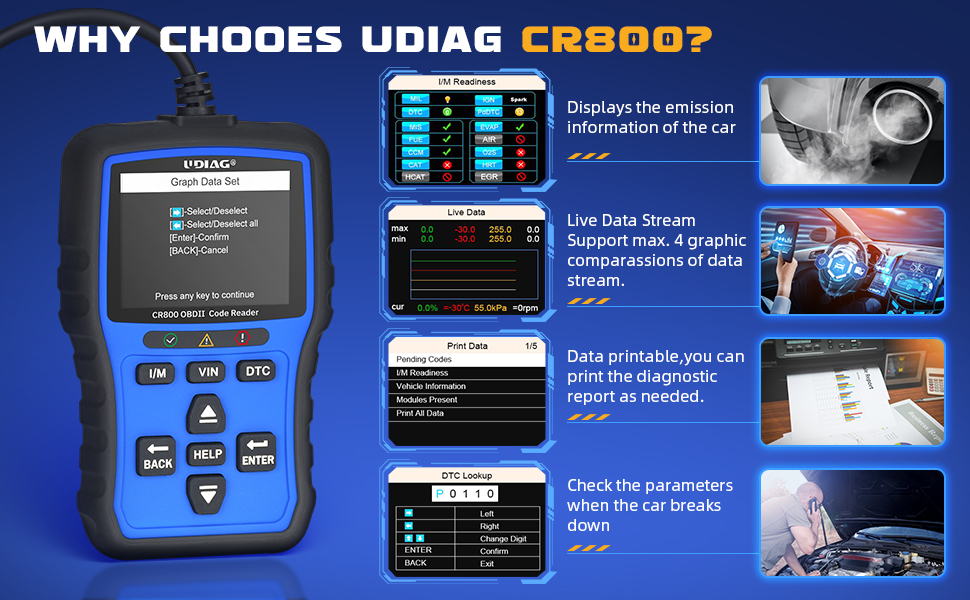OBDII Scanners: Exploring Compatibility with Various Car Makes and Models.
2023-11-14 by UDIAG
Welcome to the world of OBDII scanners, the unsung heroes of modern vehicle diagnostics! In this article, we will delve into the intricate realm of OBDII scanner compatibility and explore how these devices interact with the diverse landscape of car makes and models. Whether you’re a car enthusiast or a professional mechanic, understanding compatibility is crucial for efficient and accurate diagnostics.
I. Introduction
OBDII scanners, or On-Board Diagnostics II scanners, have become indispensable tools for anyone dealing with vehicle maintenance. They provide insights into a car’s health by accessing and interpreting data from the onboard computer. In this article, we’ll focus on a critical aspect of these scanners: their compatibility with various car makes and models.
II. Understanding OBDII Compatibility
When we talk about OBDII compatibility, we’re referring to a scanner’s ability to communicate effectively with a specific car’s onboard computer system. Compatibility ensures that the scanner can access and interpret the data unique to that particular vehicle, allowing for accurate diagnostics.
III. Universal OBDII Scanners
Universal OBDII scanners boast versatility, capable of working with a wide range of car makes and models. They are often the go-to choice for those dealing with diverse vehicle types. However, the flexibility comes with trade-offs. While universal scanners provide broad coverage, they may lack certain features specific to particular car brands.
IV. Car Make-Specific Scanners
On the other end of the spectrum, car make-specific scanners are designed with a focus on particular brands. These scanners offer in-depth compatibility, providing access to manufacturer-specific codes and diagnostics. Despite their precision, these scanners may fall short when dealing with a variety of car makes.
V. Popular Car Makes and Models
Compatibility challenges often vary based on the popularity of car brands. Some scanners seamlessly integrate with well-known makes, while others struggle with less mainstream models. Exploring these nuances helps users anticipate potential compatibility issues.
VI. Advanced OBDII Scanning Technology
As technology advances, so do OBDII scanners. Emerging technologies, such as wireless connectivity and cloud-based diagnostics, are shaping the future of compatibility. These innovations aim to bridge the gap between scanners and the evolving electronic systems in modern vehicles.
VII. Factors Influencing Compatibility
Electronic system variations among car makes pose a significant challenge to OBDII scanner compatibility. Understanding how manufacturers implement these systems and the role of software updates is crucial for users seeking long-term compatibility.
VIII. Case Studies on Compatibility Challenges
Real-world examples shed light on the complexities of OBDII scanner compatibility. From outdated software to unique electronic configurations, these cases highlight the importance of staying informed and adaptable in the face of compatibility challenges.
IX. Choosing the Right OBDII Scanner
Selecting the right scanner involves considering various factors, including the user’s needs, the diversity of their vehicle fleet, and budget constraints. We’ll provide recommendations tailored to different scenarios to help users make informed decisions.
XI. DIY Compatibility Checks
Empowering users to perform compatibility checks themselves is a proactive approach to avoiding issues down the road. We’ll outline step-by-step procedures for users to ensure their OBDII scanner is compatible with their vehicles.
XII. User Experiences and Reviews
Drawing from user feedback adds a personal touch to the exploration of compatibility. We’ll collate experiences from users with different car models, highlighting common challenges and success stories. This section aims to create a sense of community among OBDII scanner users.
XIII. Future Trends in OBDII Compatibility
Looking ahead, we’ll explore predictions for advancements in compatibility. Industry efforts to standardize communication protocols and enhance compatibility across the board will shape the future landscape of OBDII scanners.
XIV. Best Practices for Maintaining Compatibility
Ensuring ongoing compatibility requires adherence to best practices. We’ll discuss the importance of regular updates, firmware maintenance, and following manufacturer guidelines to optimize the lifespan of OBDII scanners.
XV. The Impact of Compatibility on Diagnostics Accuracy
Compatibility isn’t just about convenience; it directly influences the accuracy of diagnostic results. Understanding this connection is crucial for both car owners and mechanics, as it shapes the reliability of the insights provided by OBDII scanners.
Conclusion
In conclusion, navigating the maze of OBDII scanner compatibility is a vital aspect of effective vehicle diagnostics. Whether you opt for a universal scanner or a make-specific one, being aware of the nuances and challenges ensures you make informed decisions that align with your specific needs.
FAQs
1. Can a universal OBDII scanner work with any car?
While universal scanners offer broad compatibility, certain advanced features may be limited for specific car makes.
2. How often should I update my OBDII scanner’s software?
Regular updates are crucial to maintain compatibility, and it’s recommended to check for updates at least once a month.
3. Do car make-specific scanners provide better diagnostics accuracy?
Make-specific scanners can offer more precise diagnostics for the targeted brand, but their effectiveness depends on the user’s specific needs.
4. Can compatibility issues cause damage to my vehicle?
In most cases, compatibility issues won’t cause damage, but they can hinder accurate diagnostics, potentially leading to overlooked problems.
5. Are wireless OBDII scanners more compatible than wired ones?
Wireless scanners offer convenience but may have compatibility limitations. The choice between wired and wireless depends on the user’s preferences and specific requirements.



